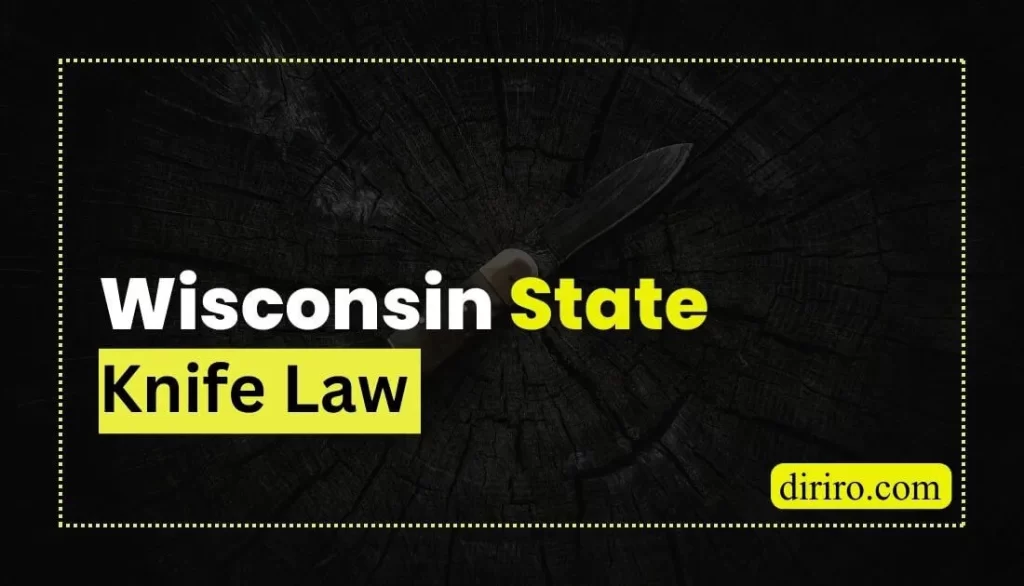Get to know the Wisconsin state knife law so you can carry your knife with confidence and avoid any legal trouble.
Knife laws in Wisconsin are laden with jargon, they’re lengthy, wordy, and challenging even for lawyers. As you read through this blog, you will learn what knives are legal and what are not. The law is decrypted and translated into plain English.
Dairyland is known for its prevalence of carrying tactical knives. Those who enjoy outdoor activities will find plenty to do in Badger State.
Here you’ll find yourself at the bottom of a rippling stream, next to a roaring waterfall, and surrounded by endless scenic trails.
This is the essence of Wisconsin. This also means Wisconsin is a hunting and fishing paradise.
When on the discovery trail. It is more vital to carry a dependable cutter or an automatic knife than to be exceptional. In light of this, it is important to be familiar with the knife law in Wisconsin.
In Wisconsin Knives that are Legal
A knife lover, outdoor enthusiast, hunter, angler, or just someone who loves knives will love Wisconsin’s knife laws. This is due to the fact that you can pretty much own any knife. The list of ‘dangerous weapons’ does not include knives. This means that it is legal for anyone to own a tactical knife, including:
- Bowie knife
- There are many disguised knives, such as pens, combs, and belt buckle knives
- A ballistic knife
- Dirks, daggers, or knives for stabbing
See Also: Best Knives for BBQ
Keep yourself safe. In Wisconsin, a ‘carry’ is defined as a handgun.
According to Wisconsin statutes, carrying means going armed. Case law has further defined that “went armed” means that the defendant had a weapon in his hand or within his reach when he committed the crime.
It was passed in 2011 that Wisconsin residents could carry concealed firearms in public if they were licensed to do so.
A license is not required for carrying a concealed knife or firearm in one’s own house, business, or on a piece of land owned, leased, or legally occupied by the individual.
There may still be some who must obtain a license under the new law. In Wisconsin, concealed weapons licenses are required to be issued by the Wisconsin Department of Justice (“DOJ”) if certain conditions are met.
Whether Knives can be Carried Concealed or Openly
The general list of “dangerous weapons” in Wisconsin now excludes the vast majority of knives, including automatic knives. As a result, most knives are not prohibited from being carried concealed.
The law, however, does not eliminate all knives from being considered as “dangerous weapons” for the purpose of transferring them to minors. Knives can be considered dangerous weapons only if they are deemed dangerous by an appeal court.
It means that a weapon is dangerous. Any device made as a weapon that can produce death or serious bodily harm, or any other device or instrumentality used as a drill.
It is calculated or likely to produce death or great bodily harm when used or intended to be used in the way that it is intended or calculated to be used. 9392.10 (ten).
This definition might categorize knives clearly designed as deadly weapons as dangerous weapons. Though not many knives would meet this definition.
It is legal to own and carry the most common tactical knives, such as automatic knives, folders, and fixed blades, both openly and concealed.
FAQ’s Wisconsin State Knife Law:
It is not illegal in Wisconsin to conceal and carry a knife (regardless of its length), unless you are prohibited from possessing firearms. In public schools and other public buildings, it is illegal to carry knives (pocket knives, switchblades, kitchen knives, machetes, etc.).
It is legal to own a gravity knife in Wisconsin. There are no restrictions on purchasing, carrying, or using gravity knives in the state.
